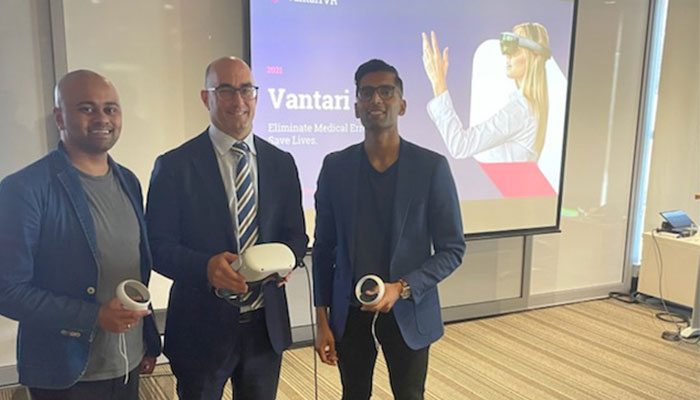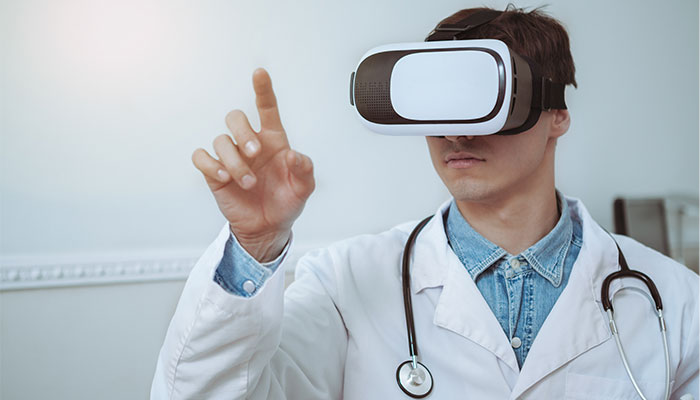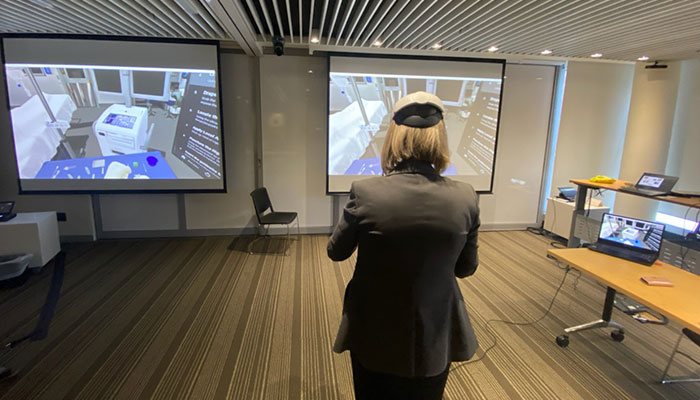A world-first virtual reality (VR) training program, developed by a Macquarie University cardiologist and health technology company Vantari VR, will soon be helping doctors learn to carry out a complex diagnostic procedure for heart patients.

Training breakthrough: Assoc Professor Martin Brown from MQ Health Department of Clinical Medicine, centre, with Vantari VR co-CEOs Nishanth Krishnananthan, left, and Vijay Paul.
Associate Professor Martin Brown has carried out hundreds of right heart catheterisations, a diagnostic test that involves inserting a catheter into the heart and pulmonary arteries via the patient's jugular vein.
"I perform one or two right heart catheters per week, usually to determine the cause of a patient's breathlessness when other tests have been inconclusive, or to assess for pulmonary hypertension (high blood pressure in the lungs) but they're not commonly performed outside pulmonary hypertension centres, like the one at Macquarie University Hospital, or heart transplant centres at large hospitals," Associate Professor Brown said.
"This makes it very difficult for cardiologists to observe and gain practical experience in performing the procedures and to become proficient in them.
A lot of what we've developed, like the virtual ultrasound and X-ray components, has never been done before.
"I remember when I was in training, my exposure to this procedure and understanding of the haemodynamics was limited. You need to be able to observe the procedure extensively, then carry out many more under supervision before you can be considered proficient.
"With our VR program, doctors can learn the process and, most importantly, learn how to read and interpret the results – all in a safe environment before they ever touch a patient."
Vantari's training program uses VR goggles and a pair of electronic gauntlets that act as the doctor's hands in the virtual world.

Clinical skills meet technology: the new virtual training platform has been taken up by hospitals and universities around Australia.
It takes them through different stages of difficulty, beginning with a demonstration of how to perform a right heart catheter and what they can expect to see in a normal case. Future development involves managing real cases, and finally introducing scenarios in which they must manage potential complications.
Along the way, the software guides doctors towards milestones in their learning, using built-in analytics to assess their progress, improvement and learning curve each time they perform the procedure.
Once the doctor is proficient in the virtual sphere, they can then progress to carrying out the test on a real patient under supervision.
How the pandemic paved the way
Associate Professor Brown originally began creating a real-world training program for right heart catheterisation three years ago using mannequins but was forced to suspend it due to travel restrictions, first when the pandemic began, then again, this year due to Sydney's Delta outbreak.
Thinking outside the box, he decided to shift to the virtual plane instead, with VR equipment that could be shipped around the country when travel was restricted. Ultimately, he is looking to take it global.
He was awarded a research grant of $87,000 for the project from Janssen Pharmaceuticals, and has been working with Vantari VR, a leader in virtual reality training for healthcare, to bring the program to life.

Safe: MQ Health's Assoc Prof Martin Brown says with VR now doctors can learn the complex process and, most importantly, learn how to read and interpret results – in a safe environment before they ever touch a patient.
"As far as we know, this is a world first," Associate Professor Brown said. "A lot of what we've developed, like the virtual ultrasound and X-ray components, has never been done before."
Vantari VR was founded in 2017 by two clinicians, Dr Nishanth Krishnananthan and Dr Vijay Paul, who with their respective careers in surgery and emergency medicine, noticed a real gap in education and training. Together with CTO Daniel Paull, they built a virtual training platform that has been taken up by hospitals and universities around Australia.
'The right heart catheter program is an exciting addition to our platform and opens up an array of potential applications in interventional cardiology," Dr Krishnananthan.
"COVID-19 has made it evident that we need to future-proof education and training and Virtual Reality is the way forward.
"Our collaboration with Associate Professor Brown started almost a year ago and what a journey it has been," Dr Paul said. "Creating a complex cardiology procedure in VR would have seemed unfathomable a few years ago but the technology has grown rapidly and we are proud to be leading the way at Vantari."
The new training system has its world premiere on October 28 at a virtual conference in Ireland.
Martin Brown is Associate Professor in the Department of Clinical Medicine at Macquarie University.






